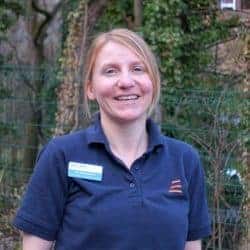Liz Stephenson is a Senior Speech and Language Therapist at STEPS Rehabilitation. She graduated from Sheffield University in 2007 with a Masters in Clinical Communication Studies and she also has a degree in Psychology. Prior to joining STEPS, she had worked in a brain injury rehabilitation unit.
She is trained to assess and manage swallowing disorder and works closely with the dysphagia trained nurses at STEPS, as well as with the catering team to ensure that eating and drinking is safe and enjoyable for those with swallowing difficulties.
In this blog, Liz explain what led her to become a speech and language therapist and what her working day involves.
I decided to become a Speech and Language Therapist because it is such a varied and creative role. After spending many years working in the community helping adults and children with a wide range of neurological conditions, I enjoy working out of one dedicated rehabilitation centre and having the opportunity and freedom to work creatively with clients.
Collaborating for effective rehabilitation
Typically I see 4-5 clients per day for therapy, some jointly with other therapists. A lot of work happens “behind the scenes”, and you will often find me working at the computer, reading admission reports, planning individual and group therapy sessions, as well as liaising with other professionals and team members to gather information on a condition or particular therapy. I really value being able to keep an holistic focus for the clients at STEPS and having other disciplines on hand in the building to discuss ideas with.
I regularly work collaboratively, with our Neurologic Music Therapist, Rebekah Keenan, because individuals with speech and communication difficulties often benefit from joint therapy sessions. The Vocal Skills Group runs weekly on a Thursday and was established by me and Rebekah to bring people together to learn about how voice and speech is produced and put skills into practice within a musical environment.
Delivering speech and language therapy
I see clients for sessions in their rooms or a space of their choice, and sometimes access the community with them for specific therapy sessions. The rehabilitation assistants often assist with implementing parts of a therapy programmes, and I try to embed myself within the clinical team on the floor to support therapies in action.
When I’m not working directly with clients, I’m also involved in the clinical administration and meetings side of things, helping to plan our client’s rehabilitation journey. Tuesdays are a busy day for meetings and I attend IDT every week, plus review meetings for clients I am working with.
Rewarding work
A rewarding part of being a Speech and Language Therapist is being able to deliver therapy that is motivating and relevant for an individual, helping them to work towards their goals in a creative way. Together with Jess Sheppy (Client Wellbeing coordinator) we have established STEPS Book Society and every Tuesday we meet for an hour to share a love of reading. The group setting is a very supportive environment for clients and provides opportunities to put communication into practice. We’ve discussed many books and been lucky enough to have had a local author visit us and talk to the group.
I love seeing the evolution of new groups to suit the needs of the clients and challenge them with different experiences. As a senior Speech and Language Therapist I find myself contributing to service development, writing and delivering training programmes and setting up working groups for small projects. There is a great deal to juggle but I don’t shy away from a challenge.
In addition to this side of my role, I also oversee how dysphagia (swallowing difficulties) are managed and am on-hand to respond to needs as they occur. There is never a dull moment as a Senior Speech and Language Therapist, and always lots of rewarding ones!
